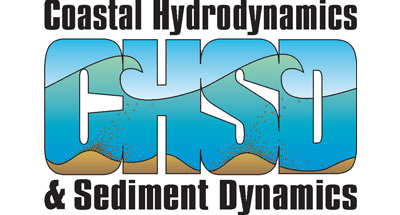Award Presentation:
Ashish Mehta (L) presents the JJ Mehta award to VIMS Professor Carl Friedrichs
during the 2013 INTERCOH Conference.
Photo by Marjy Friedrichs.
By David Malmquist
Professor Carl Friedrichs of the
Virginia Institute of Marine Science was recognized with the J.J. Mehta Award
during the 12th International Conference on Cohesive Sediment Transport
Processes in Gainesville, Florida on October 23rd. Friedrichs accepted the award
following his keynote lecture to conference participants.
The INTERCOH conference – now held
every two year – provides a platform for scientists and engineers from around
the world to share knowledge concerning the dynamics of muds and other
fine-grained sediments. Better understanding of the erosion, transport, and
deposition of these sediments—ubiquitous in estuaries and ports worldwide—is
key for global efforts to improve water clarity, keep shipping channels open,
and clean up chemical contaminants, which preferentially adhere to the tiny
grains.
The
Mehta Award, which carries a plaque and a prize of US $3,000, is named in
memory of Jayant J. Mehta by his son Ashish J. Mehta—a professor in the
Department of Civil and Coastal Engineering at the University of Florida and
INTERCOH co-founder. The elder Mehta was a pioneer in the inception and growth
of India’s petrochemical industry.
This is
only the second time the Mehta Award has been given. The first honoree was Dr.
Pierre Le Hir of Ifremer (French Research Institute for Exploration of the Sea)
at the INTERCOH 2011 meeting in Shanghai, China.
The 2013 Mehta Award honors
Friedrichs for his “outstanding achievements in research and teaching.” Dr.
Larry Sanford, a professor at the University of Maryland and member of the
Mehta Award Committee, says “The award especially honors Carl’s contributions
to our understanding of how tidal flats form, the dynamics of gravity flows,
and the behavior of sedimentary particles. His interests span a wide range of
topics and often have a strong interdisciplinary flavor.”
Friedrichs says, “I’m honored to be
recognized by my peers, and look forward to continued collaborations to better
understand the unique properties and behaviors of cohesive sediments in coastal
ecosystems worldwide.”
Joining Sanford on the Mehta Award
Committee were professors Han Winterwerp of Deltares, Inc., an applied research
institute headquartered in the Netherlands; and Bill McAnally of the Department
of Civil and Environmental Engineering at Mississippi State University.
In their formal citation, the award
committee writes
“Carl’s papers, many authored with his students and
colleagues, have been frequently cited for novel observations on the transport
of flocs in estuaries especially where turbidity maxima occur, and the physics
of coastal cross-shelf sediment transport. In 2000, Carl started a new outreach
and mentoring program called SEDIMENT (Science Education Inspired through
MENToring). Through this program high school and undergraduate students pair
with graduate students and faculty mentors in team research projects addressing
interdisciplinary processes involving sediment dynamics, such as sedimentation in
marshes and seabed mixing by benthic biota. Carl is a popular teacher who is
able to convey fundamental learning of fluid flow and sediment transport
mechanics.”
Sanford adds that “Carl’s often
simultaneous use of field observations, analytical modeling, and numerical
modeling effectively combines the strengths of these approaches and results in
a broad perspective that specialists seldom attain. His commitment to including
sediment-transport studies in real-time environmental observatories points the way
to future advances in our field.”
Since arriving at VIMS in 1993,
Friedrichs has published more than 70 peer-reviewed research articles,
including seminal work on wave-supported gravity flows and the use of acoustic
instruments to measure the velocity at which sedimentary particles settle to
the bottom following suspension by tides, currents, and waves. He has also
advised 18 graduate students, served on numerous other graduate student
committees, and mentored many undergraduate and high school students interested
in environmental research. He received a White House Presidential Early Career
Award for Scientists and Engineers in 2000, and a National Science Foundation
CAREER Award that same year. He is also the recipient of the Plumeri Award for
Faculty Excellence from William & Mary (2010), an Outstanding Faculty Award
from the State Council of Higher Education for Virginia (2008), and numerous
other awards.
Excerpted from: http://www.vims.edu/newsandevents/topstories/friedrichs_mehta_award.php

